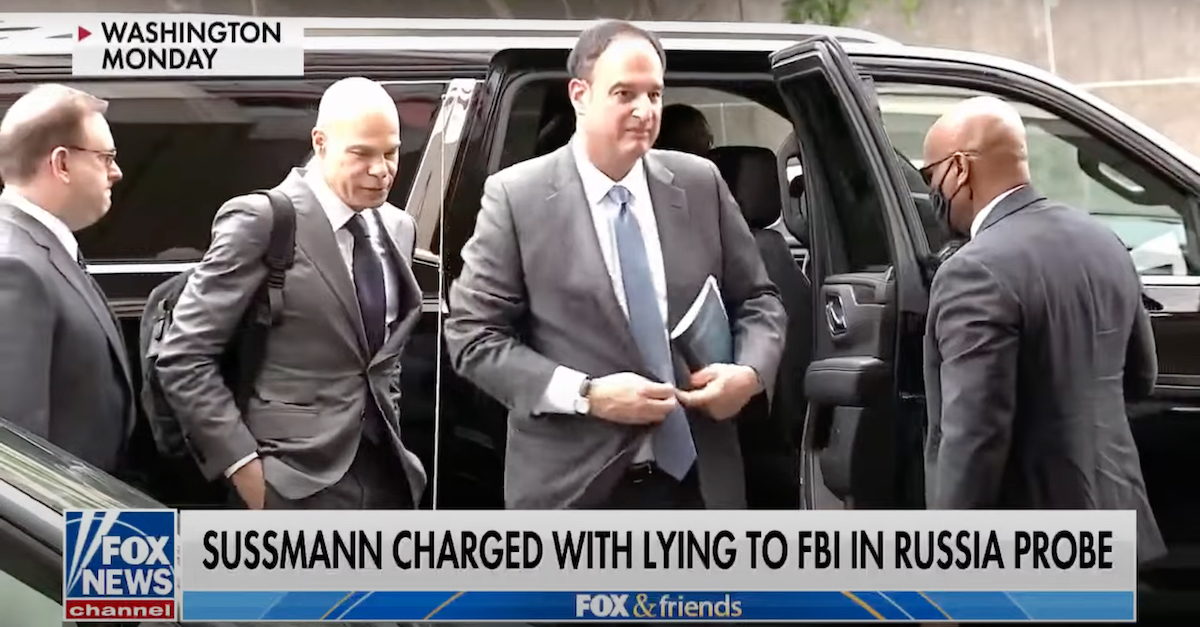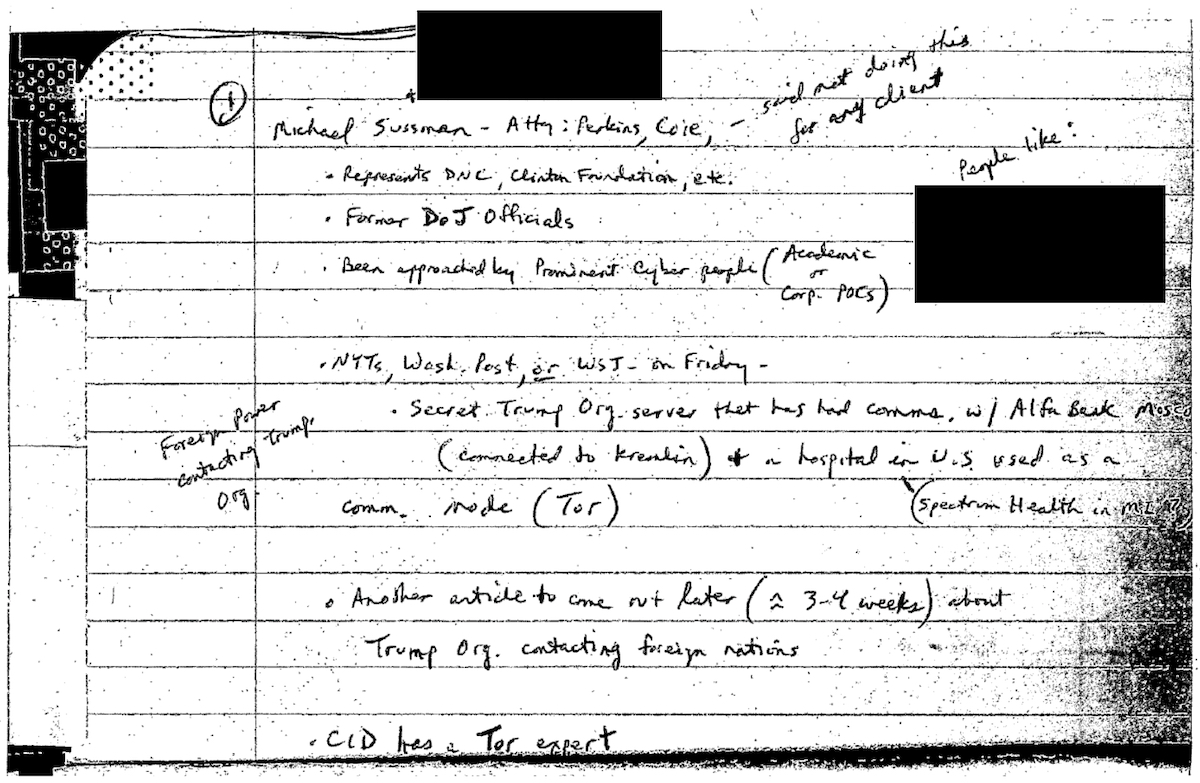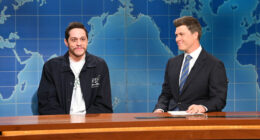
Michael Sussmann. (Image via Fox News screengrab.)
A former Perkins Coie cybersecurity lawyer has been acquitted of a single count of lying to the FBI in the lead-up to the 2016 presidential election.
A one-count indictment filed Sept. 16, 2021, by Special Counsel John Durham accused Michael Sussmann of making “a materially false, fictitious, and fraudulent statement or representation in a matter before the jurisdiction of the executive branch.”
The alleged lie, according to Durham, was that Sussmann claimed he was acting as a private citizen while giving a tip to the FBI about about Donald Trump. Durham’s team of prosecutors asserted that Sussmann was really acting on behalf of Hillary Clinton and a tech executive subsequently identified as Rodney Joffe.
“[O]n or about September 19, 2016, the defendant stated to the General Counsel of the FBI that he was not acting on behalf of any client in conveying particular allegations concerning a Presidential candidate, when in truth, and in fact, and as the defendant well knew, he was acting on behalf of specific clients, namely, Tech Executive-1 and the Clinton Campaign,” the indictment alleged.
In one message cited by Durham’s indictment, Sussmann allegedly said he just wanted “to help the Bureau” by passing along the tip.
The upshot, again according to Durham, was that the FBI took Sussmann’s tip more seriously than it would have if the FBI knew the tip was coming from Trump’s political opponents.
Notes taken by the FBI about the Sussmann conversation indicate that the Bureau knew exactly who Sussmann was — so his underlying connections to a prominent law firm with an established track record of representing Clinton and the Democratic National Committee were not unknown.

A screengrab of an April 4, 2022 Motion in Limine filed by Durham’s team contains a black-and-white copy of Bill Priestap’s handwritten notes regarding Michael Sussmann. The notes state that Sussmann worked for a firm that “[r]epresents DNA, Clinton Foundation, etc.” but also contain a notation that Sussmann apparently “said” he was “not doing this for any client.” Priestap was assistant director of the FBI Counterintelligence Division from 2015 to 2018.
The underlying tip provided by Sussmann was that internet data suggested Trump Organization computer servers were apparently communicating with servers from Russia’s Alfa Bank. The notion that the organizations were actually communicating has been since debunked.
During opening statements, prosecutors claimed Sussmann was trying to turn the FBI into a “political tool” for the Democrats.
READ RELATED: Tom Holland looks CRAZED in NYC on set of Apple’s The Crowded Room
Testimony revealed that Hillary Clinton personally okayed a decision to release to the media the shaky data suggesting a “covert communication channel” between Trump and the Russian bank — despite her campaign not being “totally confident” that the data was legitimate.
During deliberations, the jury asked to see Sussmann’s billing records. Those records showed that Sussmann coded his travel to see the FBI in expense reports as “Business Dev/Client Travel & Ent.” Sussmann argued that the records did not contain proof beyond a reasonable doubt that he was working for Clinton or for Joffe when he met with the FBI. According to a an October 2021 pretrial motion by Sussmann’s lawyers:
[T]he Indictment alleges that Mr. Sussmann billed the September 19, 2016 meeting with Mr. Baker to the Clinton Campaign, Indictment ¶ 29, while Mr. Sussmann denies that he did so. Among other evidence contradicting the Indictment on this point, there are expense reports showing that Mr. Sussmann took taxis to and from this meeting and that Mr. Sussmann expensed those taxis not to the Clinton Campaign, not to Tech Executive-1, but indeed to no client at all. These expense reports cannot be reconciled with the Special Counsel’s allegations about Mr. Sussmann’s billing, nor can they be reconciled with the Special Counsel’s theory of the case.
Sussmann’s defense tactic was two-fold: (1) his lawyers said he didn’t lie in the first place, and (2) even if a jury conceived that Sussmann lied, the purported lie wasn’t “material” to whether the FBI was going to investigate the underlying tip. Materiality is a necessary element of the crime Durham accused Sussmann of committing.
The highly publicized and political nature of the trial led U.S. District Judge Christoper Cooper to tell the attorneys to be mindful of the assertions they were including in court filings. That warning came after a Durham filing resulted in an explosion of insinuations and fodder in conservative media circles — theories from which even Durham attempted to distance himself.
The jury acquitted Sussmann shortly before noon on Tuesday after deliberating for a time on Friday. (Saturday and Sunday were natural days off; Monday was the Memorial Day holiday.)
Durham reportedly issued a brief statement after the acquittal:
Durham on Sussmann acquittal: While we are disappointed in the outcome, we respect jury’s decision & thank them for their service. I also want to recognize & thank the investigators & the prosecution team for their dedicated efforts in seeking truth and justice in this case.
— Josh Gerstein (@joshgerstein) May 31, 2022
This story, which began as a breaking news report, has been updated.
Have a tip we should know? [email protected]
Source:





